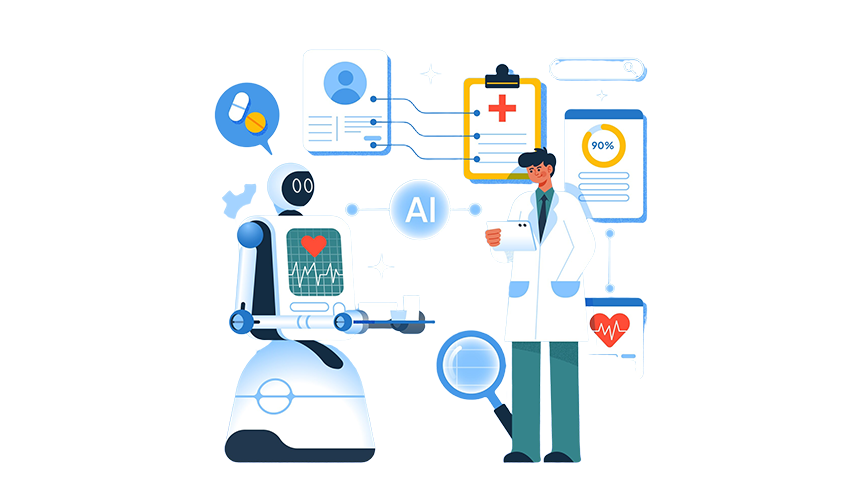This Course Structure is Curated as per the NEP-2020 Guidelines
Course Overview
The B.Sc. AI in Public Health program at Malla Reddy Vishwavidyapeeth, Hyderabad, is an interdisciplinary undergraduate course designed to equip students with the skills and knowledge necessary to leverage artificial intelligence (AI) in the fields of public health and finance. This program focuses on the integration of AI technologies, data science, and financial analytics to address key challenges in health management, policy-making, and economic decision-making.
This program focuses on equipping students with the theoretical knowledge and hands-on skills from 1st semester itself. The curriculum combines advanced AI techniques such as machine learning, predictive modeling, and big data analytics with an understanding of public health systems, financial modeling, risk assessment, and policy analysis. Students will learn to use AI-driven tools for data analysis in public health surveillance, health policy evaluation, and financial risk management. Practical training in AI-based healthcare solutions and financial technology applications ensures students can develop and implement data-driven strategies for improving both public health outcomes and financial decision-making.
Graduates of this program emerge as ‘Skilled Professionals of AI in Public Health,’ enabling them to pursue further higher studies & do research in AI in Public Health along with plenty of job opportunities globally.

Course Details
Description: 4 Years Degree Program
No. of Seats: 40
No. of Credits: 160 minimum & as specified
- Eligibility
- Curriculum Structure
- Program Outcomes
- Career Enhancement
- Higher Studies
- Job Roles & Progression
A pass in 10 + 2 with Physics, Chemistry, and Biology/Mathematics as main subjects from a recognized board (CBSE, ISC, or equivalent).
Semester | Name of the Subject |
Semester 1 | Fundamentals of Epidemiology Basics of Public Health Principles of Biostatistics Health Communication Skills Practical: Disease Surveillance Basics English & Communication Skills |
Semester 2 | Epidemiology of Infectious Diseases Environmental Health Social Determinants of Health Data Management in Epidemiology Practical: Data Collection and Cleaning |
Semester 3 | Epidemiology of Non-Communicable Diseases Advanced Biostatistics Health System Analysis Research Methodology Practical: Epidemiological Survey Design |
Semester 4 | Outbreak Investigation Global Health and Epidemiology Health Policy and Planning Indian Constitution and Public Health Practical: Outbreak Response Simulations |
Semester 5 | Epidemiological Modeling Behavioral Epidemiology Program Monitoring and Evaluation Ethics in Public Health Research Practical: Risk Factor Analysis |
Semester 6 | Advanced Data Analytics in Epidemiology Health Informatics Surveillance Systems in Public Health Practical: Advanced Statistical Techniques |
Semester 7 | Major Internship in Public Health Epidemiology: Hands-on training in health organizations, government agencies, or NGOs with a focus on disease surveillance, outbreak investigations, and public health data analysis. Internship on AI application in Public health authorities /agencies /NGOs. |
Semester 8 | Thesis/Research Project: Independent research on an epidemiological topic. |
Minor Internship: Practical exposure in outbreak management health policy evaluation, or public health program monitoring. |
- Disease Surveillance Skills: Proficiency in monitoring and tracking disease patterns across populations.
- Outbreak Investigation: Ability to investigate and respond to disease outbreaks with evidence-based strategies.
- Public Health Data Analysis: Expertise in analyzing and interpreting health data using statistical tools.
- Epidemiological Modeling: Skills in predictive modeling to assess disease risk and health outcomes.
- Policy and Program Evaluation: Knowledge of evaluating the impact of public health policies and interventions.
- Ethical and Cultural Competence: Application of ethical principles and cultural understanding in public health research.
- Certification in Disease Surveillance and Control: Specialized training in tracking and controlling disease outbreaks.
- Certification in Epidemiological Modeling: Advanced training in statistical and predictive modeling techniques.
- Certification in Global Health Epidemiology: Focused on global disease patterns and health interventions.
- Certification in Program Monitoring and Evaluation: Skills in assessing the effectiveness of public health programs.
- Certification in Health Informatics in Epidemiology: Training in using informatics tools for epidemiological analysis.
- Master’s in Public Health (MPH) with a specialization in Epidemiology.
- M.Sc. in Epidemiology or Biostatistics.
- M.Sc. AI in Public Health
- Postgraduate Diploma in Disease Surveillance.
- Ph.D. in Public Health or Epidemiology.
- Fellowship in Global Health Epidemiology.
Duration | Roles and Responsibilities | Salary Range |
0-3 years | AI Public Health Analyst, Healthcare Finance Assistant, Data Scientist | ₹5,00,000 – ₹7,00,000 per annum |
3-5 years | Senior AI Analyst, Health Data Consultant, Financial Analytics Specialist | ₹7,00,000 – ₹10,00,000 per annum |
5-10 years | Health Systems Manager, AI Policy Advisor, Financial Technology Lead | ₹10,00,000 – ₹18,00,000 per annum |
10+ years | Director of AI in Public Health, Chief Data Scientist, Global Finance Strategist | ₹18,00,000+ per annum |

Fee Structure Per Academic Year - 2025
| Tuition Fee | Miscellaneous Fee | Scholarship | |||
| 125000 ₹ | 15000 ₹ | Above 95% – 125000 ₹ | Above 91% – 62500 ₹ | Between 81-90% – 12500 ₹ | Between 71-80% – 6250 ₹ |
| Tuition Fee | Miscellaneous Fee | Scholarship | ||
| 125000 ₹ | 10000 ₹ | Above 90% – 25000 ₹ | Between 80-90% – 12500 ₹ | Between 70-80% – 6250 ₹ |



